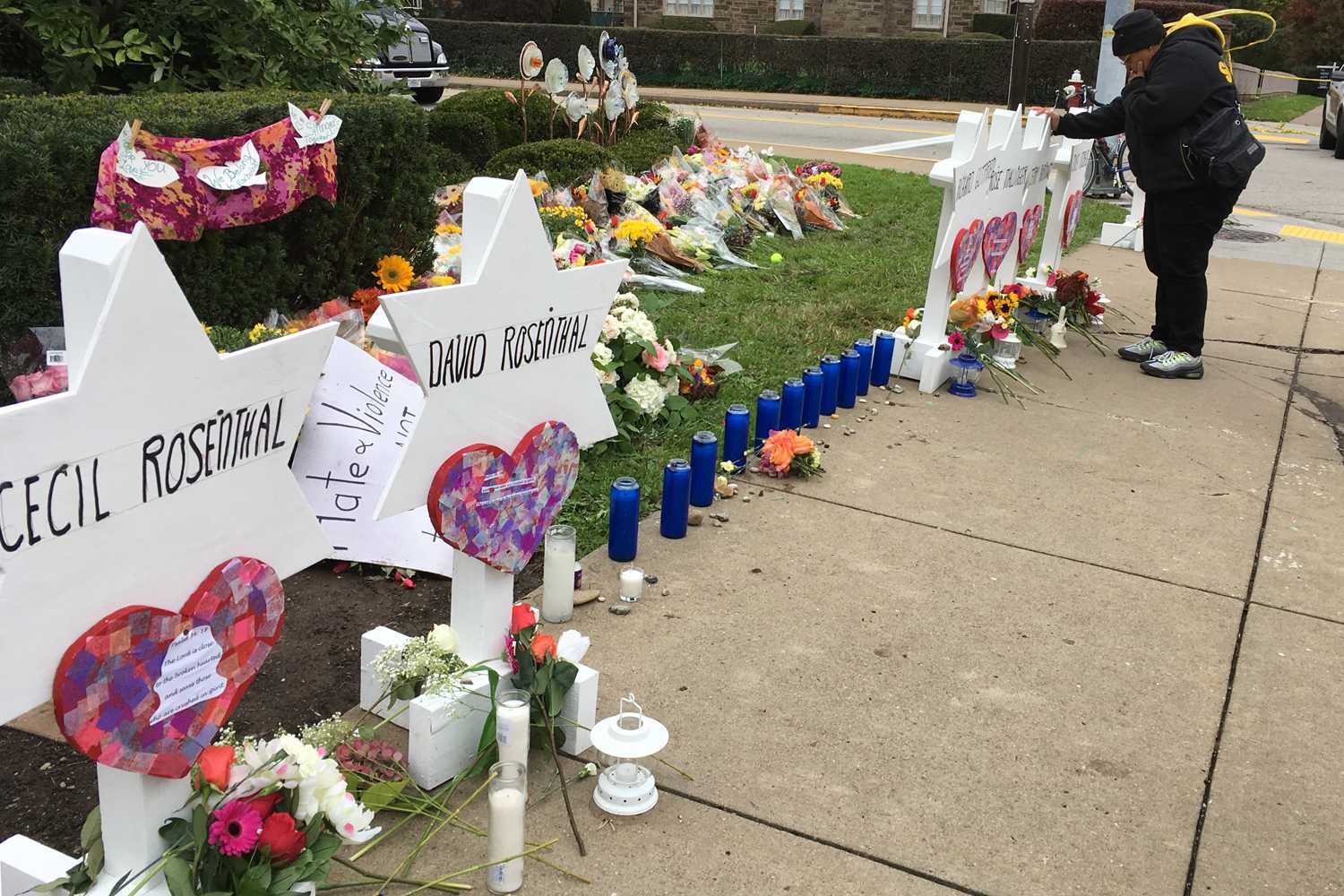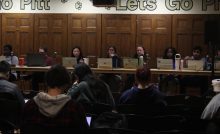Jewish students remember Tree of Life on Hanukkah


A mourner rests her hand on a Star of David that read the name of a victim in the Tree of Life Synagogue massacre in October.
In the aftermath of the Tree of Life tragedy that claimed 11 lives Oct. 27, Sami Robertson’s perspective on the story of Hanukkah changed.
“I think for me, it brings into light the idea that our light is still burning, and we should remember the people that have passed while persevering with our future generations,” Robertson said.
Robertson, a junior studying Spanish and French who grew up in Philadelphia, is one of approximately 1,600 Jewish undergraduates currently studying at Pitt. In light of the recent Tree of Life massacre that occurred in neighboring Squirrel Hill, some students like Robertson will spend their holiday reflecting on what the celebration means to them.
Hanukkah, which means “dedication” in Hebrew, celebrates the rededication of the Second Temple in Jerusalem after the people of Israel revolted against oppressors trying to convert them to Greek paganism in the second century B.C. This year’s celebration began on the evening of Dec. 2 and is observed for eight nights, symbolizing the eight nights the menorah remained lit in the Second Temple during the revolt.
Deirdre Nuebel, a first-year undecided student from New York, said she’s always felt the importance of celebrating Hanukkah, but feels that it’s even more important to recognize her Jewish faith in the aftermath of the Tree of Life shooting.
“It just emphasizes that when a Jewish holiday comes, it is nice to celebrate it and it is nice to be with people from the community and recognize that our being Jewish is something important, no matter how often you do or don’t go to temple,” Nuebel said.
Due to the rise of anti-Semitic acts globally, Robertson said she was not surprised to hear about anti-Semitic acts in the United States — like the Tree of Life shooting, the vandalism in a Jewish professor’s office at Columbia and swastikas found in a library book at Carnegie Mellon University. In addition to the traditional prayers recited when the menorah is lit, she wants to include a traditional prayer of healing, mi shebeirach.
“I’ve frequently gone on Wikipedia and looked up all of the anti-Semitic acts that have occurred, most specifically in Europe and it’s very frightening and so I was not surprised that this happened, unfortunately,” Robertson said. “I think it just makes me more melancholic that these people don’t get to celebrate Hanukkah.”
Nuebel doesn’t participate in any Jewish student organizations, but she still wanted to find a way to celebrate the holiday with other students this year. She crafted a menorah out of colored butcher paper and hung it up in her dorm hallway, in hopes that it would make other Jewish students feel more at home for their first Hanukkah at college.
“You can’t light a menorah, so I figured that we would do the next best thing and have one in spirit. We plan on putting up the candles each night, cutting out paper candles and putting them on,” Nuebel said. “Doing something like this and putting a menorah up, even if it’s not an actual one, I think for a lot of people it engrains a familiar sense of home to them.”
In hopes of supporting the Jewish community, Alana Castle, a first-year student studying psychology and neuroscience, created a public digital art project called “Messages of Hope for the Holidays.”
Castle, who is not Jewish, invited students to create a few words, drawings or other forms of art with a message of support and submit them before December began.
“After the tragedy happened at Tree of Life, I knew I wanted to do something,” Castle said. “I met with Professor Aaron Henderson, who’s [an] associate professor for studio arts here at Pitt, and he suggested the idea of utilizing the Forbes Digital Plaza for something like this.”
Castle, the former Miss Teen of America, plans on working with OBID to take student-submitted works that demonstrate peaceful and supportive messages for all people, and displaying them on the Forbes Digital Plaza through the holiday season. The submissions number about 15, which isn’t as many as Castle hoped, but she wasn’t focused on the numbers when evaluating the success of the project.
“My biggest thing wasn’t how many we got, but that some people who felt compelled would submit something,” Castle said.
“Messages of Hope for the Holidays” isn’t the only recognition of Hanukkah on campus. Many Jewish student organizations, like Hillel groups and Chabad, are hosting events for students celebrating Hanukkah. One of the largest Jewish student organizations, Pitt Hillel, is hosting a communal candle lighting at the Hillel Jewish University Center on each of the eight nights of the holiday.
Renee Cantor, a first-year English literature and writing major, is a part of Hillel’s Challah for Hunger. She said before leaving for college, she typically celebrated Hanukkah with her family by lighting their menorah after dinner and saying traditional prayers.
“I’m sad that I’m not going to be home, because I’m missing [Hannukah] by a few days, but I’m excited to spend it here with my new friends,” said Cantor.
After the recent events that have impacted the Jewish community of Pittsburgh, Robertson said the origins of Hanukkah had become more meaningful than ever.
“Religiously for me, the whole story of Hanukkah is that this light burned and that really, I think, is a metaphor for us,” Robertson said. “It is the idea that our light is still burning.”
Recent Posts
SGB addresses concerns about ICE presence on campus, hears SJP lawsuit against administration, approves governing code bill
At its weekly meeting on Tuesday at Nordy’s Place, Student Government Board heard concerns about…
ACLU of Pennsylvania sues Pitt over SJP suspension
The ACLU of Pennsylvania filed a federal civil lawsuit against the University of Pittsburgh and…
Marquan Pope: The ultimate shark
One of the most remarkable things about sharks is that an injury doesn’t deter them.…
Who Asked? // Do we really get a summer vacation?
This installment of Who Asked? by staff writer Brynn Murawski mourns the seemingly impossible perfect…
Notes From an Average Girl // Notes from my junior year
In this edition of Notes From an Average Girl, senior staff writer Madeline Milchman reflects…
Meaning at the Movies // The Power of the Movie Theater
In this edition of “Meaning at the Movies,” staff writer Lauren Deaton discusses her love…

